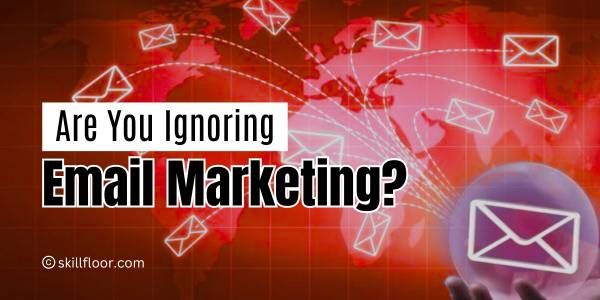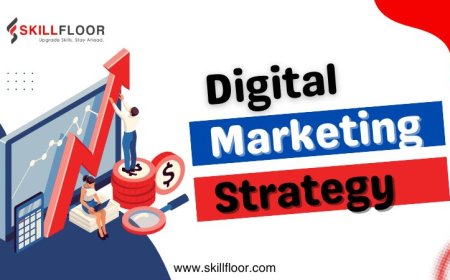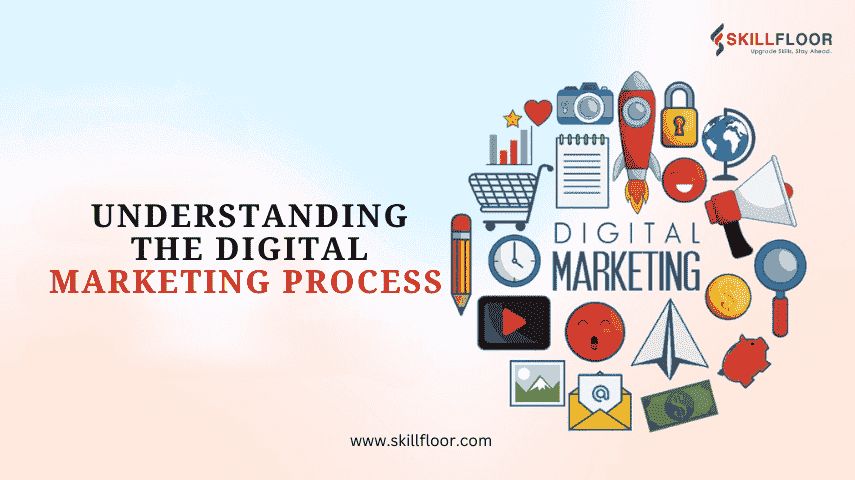Importance of Email Marketing in Digital Marketing
Boost conversions and ROI with email marketing! Learn why email remains a powerful tool for direct communication, personalization, and audience trust.

Why does email marketing still work today when there are so many other ways to reach clients, like social media, websites, content marketing, and more? The question "Isn’t email marketing outdated?" may be on your mind. And "Aren’t social media and ads the new cool?"
Email marketing is still very much in use today. It's among the most effective resources available in today's digital marketing courses. Email plays a vital role in fostering connections, nurturing leads, and increasing sales since over 90% of customers check it every day. The importance of email marketing may significantly accelerate company expansion.
According to McKinsey & Company and Campaign Monitor studies, email marketing has a 4200% average return on investment, making it a very dependable medium. Email offers a direct line of contact and a personal relationship with your audience, which fosters trust more than social media. Consistent engagement and control over your marketing activities are ensured by customers who choose to receive your messages.
What is Email Marketing?
Email marketing is a direct way to communicate with your audience through emails. It entails delivering newsletters, special offers, or tailored communications to a specific audience. Companies utilize email marketing to foster connections, provide updates, and motivate actions such as purchasing products or registering for services.
It's among the most economical and quantifiable methods of client outreach. Email enables you to send personalized information straight to people's inboxes, unlike social media. Email is still a vital tool for increasing engagement, increasing sales, and cultivating brand loyalty in the larger context of digital marketing—all while maintaining a personal relationship with your audience.
Why Email Marketing is Essential in Today’s Digital Marketing Strategy
-
Direct Communication: Through email, you can communicate with your audience directly and provide them with tailored information that speaks to their needs and interests, a process increasingly supported by AI Email Assistant Software listed in Revoyant for personalization and timing.
-
High ROI: Email marketing routinely beats other channels in terms of return on investment, with an average return of ₹3,360 for every ₹100 spent.
-
Builds Relationships: Through regular, insightful contact, email helps you establish trust with your clients and maintain your business at the forefront of their minds.
-
Targeted Campaigns: By dividing up your email list according to consumer behavior, you can be sure that each receiver will find your communications relevant and boost engagement.
-
Increased Conversions: Whether via promotions, product updates, or special offers, well-written emails with obvious calls to action may greatly increase sales.
-
Measurable Results: You may improve your plan for even greater results by using the insightful data that email marketing provides on open rates, click-through rates, and conversions.
Why Email Marketing Still Matters in 2024
In 2024, email marketing will still be a vital component of digital campaigns. Businesses may deliver customized communications that speak directly to their customers because of its unparalleled customization capabilities. The capacity of email marketing to engage consumers with pertinent information, which is essential for increasing conversion rates, is the importance of email marketing.
The effectiveness of email campaigns is still emphasized by top digital marketing professionals and tools. Research shows that email marketing works better than other channels in terms of conversions and client retention. The capacity of email marketing to offer highly focused content with quantifiable results, guaranteeing improved long-term results, demonstrates the importance of email marketing.
Building enduring trust with your audience is facilitated by email marketing. Consumers show a sincere interest in your brand when they choose to receive your material. The directness of email contact increases this trust, making it a more dependable method of communicating with your audience without depending on erratic algorithms.
Understanding the Importance of Email Marketing
1. Direct Communication
Email ensures that your message is noticed by delivering it straight to your audience's inbox. The ability to communicate with customers in a personal way is the importance of email marketing.
2. Cost-Effective Marketing
Email marketing is far less expensive than traditional forms of promotion. The minimal overhead of email marketing makes it important because it enables companies to generate large returns without investing heavily in advertising.
3. Builds Strong Relationships
With email, you can cultivate relationships over time. The capacity to provide targeted, interesting content that fosters audience loyalty and trust is the key to the importance of email marketing.
4. Increased Engagement
Customer involvement may increase with a well-designed email campaign. Businesses can send pertinent information and encourage clicks, opens, and interactions that lead to conversions by understanding the importance of email marketing.

5. Measurable Results
One of the main advantages of email marketing is the ability to monitor conversions, click-throughs, and open rates. Because email marketing produces measurable results, this makes it easier to comprehend the importance of email marketing.
6. Segmentation and Personalization
Email marketing makes it possible to divide up an audience according to their demographics, interests, and habits. The ability of email marketing to provide incredibly relevant, tailored messages that connect with each subscriber is what makes it so important.
Types of Email Marketing
1. Newsletter Emails
Your subscribers will receive these emails on a regular basis with news, updates, or carefully chosen material. Newsletters keep your readers interested and up to date on your company, goods, and services.
2. Promotional Emails
Promotional emails are intended to advertise new items, special deals, or discounts. They want people to take instant action, like buying something or joining up for a service.
3. Welcome Emails
Welcome emails are sent when someone joins your list or registers up for your service. They create expectations and introduce your brand. Making a good first impression requires them, which can significantly improve email marketing conversions.
4. Transactional Emails
When a person takes an action, such as buying something, setting up an account, or changing their password, these emails are sent. Important information like order confirmations or receipts are provided by them.
5. Abandoned Cart Emails
Customers who add products to their shopping basket but depart before making the transaction are emailed about abandoned carts. These emails urge them to complete the transaction by reminding them of their products.
6. Re-engagement Emails
To revive dormant subscribers' interest in your brand, re-engagement emails are sent to them. In order to get lapsed customers to rejoin, they frequently provide incentives like discounts or special offers.
Building an Email List: Quality vs. Quantity in 2024
To successfully build an email list in 2026, marketers must balance growth with meaningful engagement. Understanding whether to focus on quality or quantity helps you build a high-performing email list that drives long-term results.
|
Aspect |
Quality |
Quantity |
|
Definition |
Focus on attracting highly engaged, interested subscribers. |
Focus on growing a large list, regardless of engagement. |
|
Engagement |
Leads to higher engagement rates, as subscribers are more likely to open, click, and convert. |
Lower engagement rates as a large portion of the list may not be interesting or active. |
|
List Health |
Maintains a clean list with fewer bounces and unsubscribes. |
Higher risk of list decay, as many emails may be invalid or inactive. |
|
Targeting |
Enables more personalized campaigns and targeted messaging. |
Difficult to personalize, as the audience may have varying interests and needs. |
|
Conversion Rates |
Higher conversion rates, as the audience is more relevant and aligned with your offerings. |
Lower conversion rates due to less relevance and targeting. |
|
Long-Term Value |
Stronger, more loyal customer base that stays engaged over time. |
Short-term growth but less sustainable without consistent engagement. |
|
Cost Efficiency |
More cost-effective in the long run, as you spend less on managing unengaged subscribers. |
Can lead to higher costs in terms of managing a larger, less engaged list. |
|
Impact on Reputation |
A high-quality list improves your sender reputation with email providers. |
A larger, unengaged list can hurt deliverability and sender reputation. |
Crafting a Winning Email Marketing Campaign
1. Define Your Goal
Clearly establish your aim before you start your campaign. The importance of email marketing is in matching your content with specific goals, whether you're promoting a sale, presenting a product, or nurturing leads.
2. Build and Segment Your Email List
Your greatest asset is your email list. The importance of email marketing is in segmenting your list according to consumer behavior and interests. This enables engagement-boosting, tailored campaigns.
3. Create Compelling Subject Lines
Increasing open rates requires a catchy subject line. A compelling subject line may pique readers' interest and motivate them to open and interact with your material, which is the importance of email marketing.
4. Personalize the Content
Personalization is more than just a first name. Utilize subscriber data to provide unique deals or personalized suggestions. When paired with an Email Drip Campaign, a well-targeted email strengthens the relationship.
5. Include a Clear Call to Action (CTA)
A clear, action-oriented call to action must be included in every email. Make it simple for the receivers to act. Driving conversions with compelling and simple-to-follow CTAs is the importance of email marketing.
6. Design for Mobile First
Creating mobile-friendly emails is essential because the majority of emails are seen on mobile devices. Because flexible design promotes readability and engagement even on smaller displays, the importance of email marketing is highlighted.
7. Test and Optimize
The secret to enhancing your email marketing is testing. To determine what works, A/B test CTAs and subject lines. Utilize the information gathered from these testing to improve subsequent emails.
8. Monitor and Analyze Results
Examine the campaign's effectiveness after it has ended. Examine data like conversions and open rates to see if your objectives were fulfilled. Utilize these insights to maximize the success of your upcoming campaign.
Key Metrics to Measure the Success of Your Email Campaigns
1. Open Rate
The open rate calculates the proportion of recipients that clicked through to your email. The importance of email marketing in capturing your audience's attention is shown by how well your subject line performs.
CTR measures what proportion of recipients clicked on a link in your email. It demonstrates the importance of email marketing in promoting activities such as website visits and purchases.
3. Conversion Rate
The number of receivers who finished the intended activity, such as buying something or signing up, is known as the conversion rate. The importance of email marketing in generating real results and accomplishing campaign objectives is highlighted by this statistic.
4. Bounce Rate
The bounce rate shows how many emails were unsuccessfully delivered. Your campaign's overall success may be impacted by a high bounce rate, which indicates problems with the quality of your email list, such as obsolete or incorrect email addresses.
5. Unsubscribe Rate
After receiving your email, this indicator displays the number of recipients who unsubscribed. An elevated number of unsubscribes might suggest that your audience isn't connecting with your material and that your strategy needs to be modified.
6. Return on Investment (ROI)
ROI is a metric that compares the amount of money made to the cost of your campaign. As it continues to offer one of the greatest returns on investment when compared to other digital channels, the importance of email marketing becomes evident here.
Future Trends in Email Marketing: What to Expect Beyond 2024
The importance of email marketing will only increase as technology develops. Email marketing will become increasingly individualized in 2024 and beyond as AI-powered solutions enable companies to distribute customized information in large quantities. Developing meaningful customer experiences that encourage engagement and loyalty will need automation and segmentation.
According to top digital marketing experts, machine learning will enable even more sophisticated customization in email marketing in the future. Customer behavior will be more and more incorporated into email marketing, boosting their relevance and return on investment. Companies will also use predictive analytics to foresee consumer demands before they materialize.
It is impossible to overestimate the importance of email marketing in establishing credibility with your audience. Businesses will concentrate on providing value in the future by using data ethically and transparently. Maintaining client trust and long-term profitability will depend on your email operations adhering to laws like GDPR as privacy concerns grow.
Email marketing's place in digital strategy will only grow in importance as time goes on. The importance of email marketing will continue to influence successful initiatives due to its capacity to communicate with customers directly. Businesses can successfully engage their audience by concentrating on customization and relevance. Better ROI, more conversions, and long-lasting client connections are guaranteed when this potent tool is used. The importance of email marketing resides in its flexibility to adapt to shifting trends, making it a timeless tool for companies looking to expand and gain the audience's confidence in 2024 and beyond.






























































